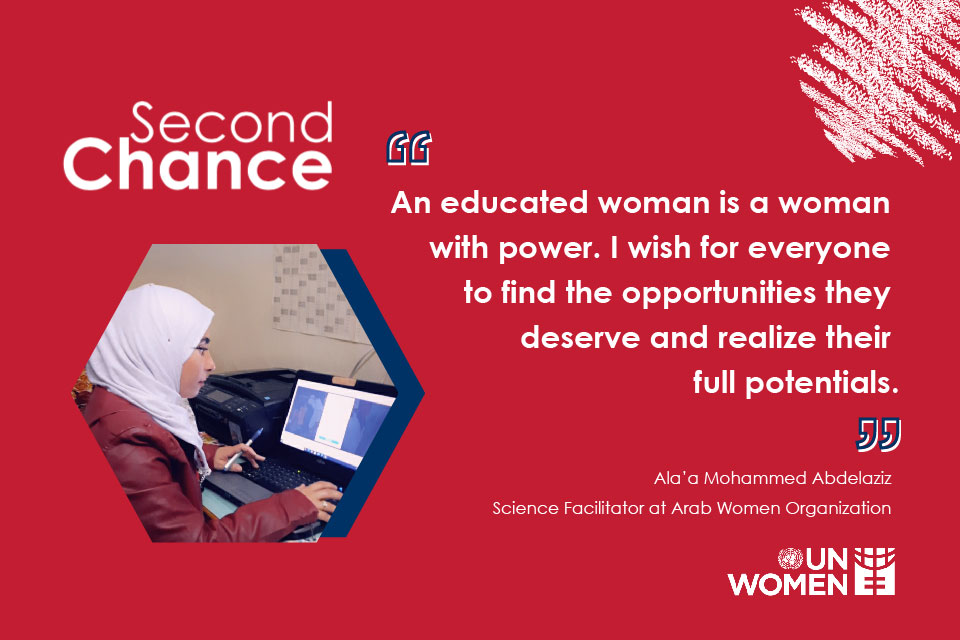From where I stand: “An educated woman is a woman with power”
Date:
Ala’a Mohammed Abdelaziz, 31 years old, is a facilitator at the Arab Women Organization for the UN Women’s Second Chance Education and Vocational Learning programme in Al-Taibeh, Kerak. Passionate about knowledge sharing, she is helping vulnerable women to fill the gaps in their education and grab the opportunity they need to fulfill their potential and earn an income.

![]() Education is important for everyone but particularly for women, because an educated woman is a woman with power. Whether she is working or taking care of her children, education can provide her with the skills to succeed. Not only she is more equipped to ensure the well-being of her family, but she can also leverage her knowledge to establish a business and gain an income. This is vital to thriving communities too.
Education is important for everyone but particularly for women, because an educated woman is a woman with power. Whether she is working or taking care of her children, education can provide her with the skills to succeed. Not only she is more equipped to ensure the well-being of her family, but she can also leverage her knowledge to establish a business and gain an income. This is vital to thriving communities too.
I know this from personal experience. I have a bachelor’s degree in chemistry technology from al Tafila University and, during that time, I also taught myself computer and programming skills. I’m passionate about knowledge sharing and I used to teach science to children. However, employment opportunities in this field are limited in my area.
I recently joined the UN Women’s Second Chance Education and Vocational Learning (SCE) programme as facilitator for the Arab Women Organization. The programme provides learning opportunities for marginalized and young women in Jordan who faced several barriers during their lives in continuing or completing their education, and who are at risk of being left behind. We offer a tailored learn-to-earn approach, leveraging the opportunities of innovative teaching approaches and digital technologies, with the goal of helping them accessing the labor market and reaching financial independence.
Our students range from women who did not receive any kind of education, to those who have completed higher education but haven’t been successful in transitioning to stable employment. We are also reaching Syrian women in Jordan’s refugee camps. I’m currently working with a group of 72 women and facilitators at the Oasis center managed by the Ministry of Social Development and UN Women in Al-Taibeh, Kerak.
We use a platform called ‘Kolibri’, an extension of the Learning Equality portal, where participants can access a reach library of educational content, including videos, articles, and presentations directly from their smartphones. All material is available in Arabic, covering key subjects such as computer and programming courses, business and administration. We also deliver the Jordanian math and Arabic curriculum, so mothers can help children with their homework. There is also important educational material on nutrition, health – including mental health - and first aid, so the women can have some practical tools to apply in their day-to-day family life.
As the COVID-19 pandemic hit, we were forced to move all activities online. At first, the transition was not easy. We lost the face-to-face contact with students, which made it difficult to understand what they were going through. Thanks to the SCE programme, we ensured all women were able to transition to virtual learning, providing them with a stable internet connection and computers. We also checked on them regularly via phone and social media to ensure they were receiving the support they needed. It was interesting to see that participants became more self-directive in their learning, dedicating extra time and efforts to do their researches.
Despite the challenges, we also witnessed some good results. For example, we have students currently enrolled in schools who have started their own business in making mobile phone accessories. Other women are using the material on health and nutrition to support family members with diabetes and hypertension.
I am a strong believer in knowledge sharing. I have seen many people with high potential but who were not able to find the opportunities they deserve because they did not get a chance - just yet. Personally, I love to share what I learned with others, because even a small piece of information can be a gamechanger for another person. Even now, after this experience, I enjoy learning new skills and, as I see positive change happening in the world, I feel even more motivated to be the part of this change.”